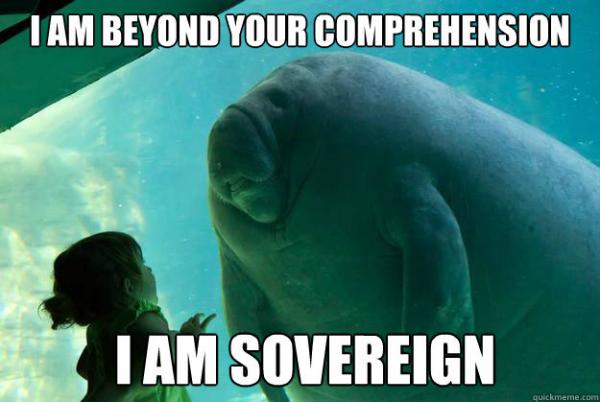Sovereignty is a type of political power, and it is exercised through some form of government. For the sake of simplicity, I will focus on the United States and its treaty federalism. In the US, there are basically three types of sovereigns:
–The US Federal Government
–Each of the 50 State governments
–Tribal governments
The US Federal government is sometimes called the supreme sovereign of the United States. Its powers are defined and limited by the US Constitution. It represents the largest focus of political, economic, and legal power, and has some (but not absolute) power over other sovereigns within the US. As a constitutional democracy, its power is supposed to come from the People—its citizens.
The State governments derive much of their sovereign power from the US Federal government. The US Constitution explicitly grants States residual powers—those powers that are not explicitly given to the Federal government. The Tenth Amendment to the US Constitution reads,
“The powers not delegated to the United States by the Constitution, nor prohibited by it to the States, are reserved to the States respectively, or to the people.”
Tribes have sovereignty that is obviously older than the US Constitution. Tribes had their own form of government, and many had legal codes written into their own documents, their own stories, their own practices, and their own memories. Tribal sovereignty is derived from the people, the land, and their relationships; tribal sovereignty was not a gift from any external government. Tribal sovereignty is not defined in the US Constitution. But anyone at all familiar with the history of US Indian Policy knows that many limitations—as well as possibilities—for tribal sovereignty have been defined over time.
Tribal sovereignty is recognized in the US Constitution. Article VI, Clause 2 (sometimes called “the supremacy clause”) of the US Constitution says:
“This Constitution, and the Laws of the United States which shall be made in pursuance thereof; and all treaties made, or which shall be made, under the authority of the United States, shall be the supreme law of the land; and the judges in every state shall be bound thereby, anything in the constitution or laws of any state to the contrary notwithstanding.”
This clause is why American Indian treaties are so important to understanding sovereignty. Treaties are agreements made between sovereign entities—usually called nations. The US has signed several hundred treaties with Indigenous nations and other nations around the world. International relations occur through, and are often defined by, international treaties. Therefore, by signing a treaty, both sides are showing that they recognize the sovereignty of the other, and the treaty spells out how each nation will relate to the other as nations.
The relationship between many tribes and the US Federal government is based on treaties. The US Federal government did not have treaties with the individual States. The supremacy clause recognizes that tribal nations and other international laws are just as powerful as the US Constitution itself. This also means that the sovereignty of tribal nations is different—and in many ways higher—than the sovereignty enjoyed by individual States
Tribal sovereignty was immediately (if inconsistently) recognized by Europeans as they explored the hemisphere. Christopher Columbus himself wrapped his descriptions and interactions with “Indians” in the language of nationhood. This wasn’t progressive or respectful, though. It was a holdover from the Inquisition and other efforts to destroy and/or exploit nonchristian nations.
We all should know by now that Columbus was genocidal. Despite being a violently domineering slave trader, usurper, and land thief, the fact that he used the language of nationhood gives us a clue that sovereignty does not need to be absolute for it to be real, or legal, or recognized by other nations.
In fact, we can look to the Roman philosopher Cicero to explain how national sovereignty may be recognized despite a very unequal power relationship. He said:
“Every nation that governs itself, under whatever form, without dependence on any foreign power, is a sovereign state. Nations or states are body politic, societies of men united together for the purpose of promoting their mutual safety and advantage by joint efforts of their combined strength.”
At first, this seems like the usual understanding of sovereignty as meaning absolute power, or at least absolute independence. This is the type of sovereignty celebrated by US patriots, anti-treaty rights activists, the TEA Party, and others who think that “might makes right” is a good idea. However, Cicero continues:
“We ought to include as sovereign states those who have united themselves with another more powerful by an unequal alliance, in which, as Aristotle says, to the more powerful is given more honor, and to the weaker more assistance. Provided the inferior ally reserved to itself the sovereignty, or the right of governing its own body, it ought to be considered as an independent state that keeps up an intercourse with others under the authority of the law of nations.”
The fact that other nations lack power, or may be dependent upon other nations, does not detract from their status as sovereigns. The US Supreme Court once defined tribes as “domestic dependent nations,” but this does not prevent the use of the term, “sovereignty,” to describe tribes. The treaties between tribes and the US Federal government are recognized as being equal to the US Constitution as the supreme law of the land. Even the ancient philosophies of Europe demand legal, ongoing treaty relations between nations that may be unequal in power.
Thus, absolute power is not necessary for sovereignty to exist. In fact, the US Constitution limits the sovereignty of the US, not only by recognizing the co-supremacy of international treaties, but by delegating some powers to the States. Most importantly, the US Constitution has recognized that the citizens themselves hold residual powers, or all those powers not granted to the State and Federal governments.
This is similar to a feature of American Indian treaty law, where those powers—those rights—not explicitly given up to the US Federal government are still held by tribes. Here is where we find the inherent sovereignty of tribes, and this is where many tribes have exercised their self-determination in ways like language revitalization, treaty rights, and Indigenous governance.
Absolute independence is also not necessary for sovereignty to exist. After all, how “independent” is the US? Does the US have energy independence? Trade independence? Manufacturing independence? Technological independence? Military independence? Resource independence? Agricultural independence? Economic independence? In many respects the US is dependent upon other nations for these things, but I rarely hear anyone doubt the sovereignty of the US. While the economic situation for most tribal nations is dire, we have to remember that tribal economies were based on access to land. Lands were ceded to the US by treaty in exchange for tribal economic security and other provisions. It is ridiculous to blame tribes for economic dependence, when that dependence arose from loss of the very lands that allow Americans to enjoy economic success, especially since holding 97 percent of the land base is still somehow not enough to support the desires of the US: they’re still after our lands and resources.
So what is the defining aspect of sovereignty? It’s not independence. It’s not absolute power. The defining aspects of sovereignty are the international relationships carried out as sovereign nations. Treaties are the most obvious evidence that one nation recognizes or acknowledges the sovereignty of another nation. This is why it is possible to say that the United States, as a nation, was not born in 1776 with the Declaration of Independence, or in 1789 with the establishment of the Constitution. No, the US became a nation with the Treaty of Paris in 1783. Put another way, the US only became a legitimate, recognized nation by entering into a treaty relationship with other recognized sovereign nations.
So next time someone says that Indigenous nations are “only quasi-sovereign” or “only domestic dependent nations,” kindly teach them about law, history, and philosophy. And if that someone is a Governor, tell them they’re just jealous of the inherent superiority of tribes over states.

Shaawano Chad Uran, a member of the White Earth Nation and professor of American Indian Studies at the University of Washington, received his PhD in Anthropology, concentrating on Ojibwe language revitalization, in 2012 from the University of Iowa. He completed his undergraduate work at the University of Minnesota. Urah has taught at Bowdoin College in Maine, the University of Victoria in British Columbia, The Evergreen State College in Washington, and the University of Washington.
Uran’s research areas are: Indigenous language revitalization, language and identity, American cultural studies, language ideologies, American Indian sovereignty, critical theory, Native American studies, and coloniality. He is also known for applying Indigenous critical theory to zombie films and literature.
He currently lives north of Seattle, Washington.
Read more at http://indiancountrytodaymedianetwork.com/2014/01/03/professor-breaks-down-sovereignty-and-explains-its-significance-152958



